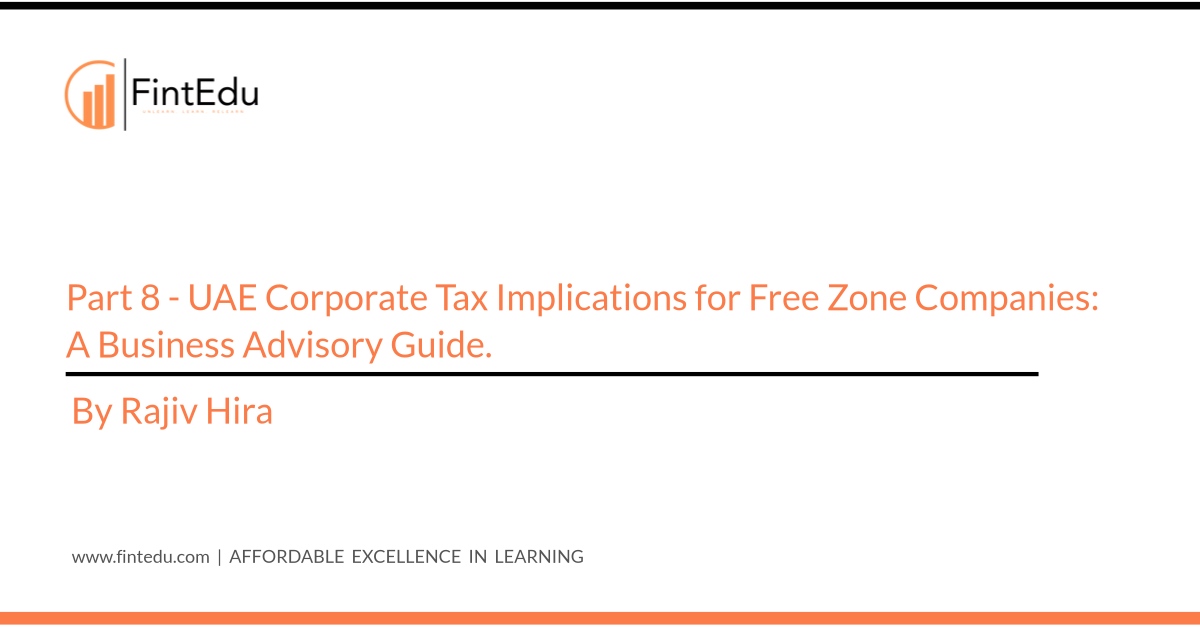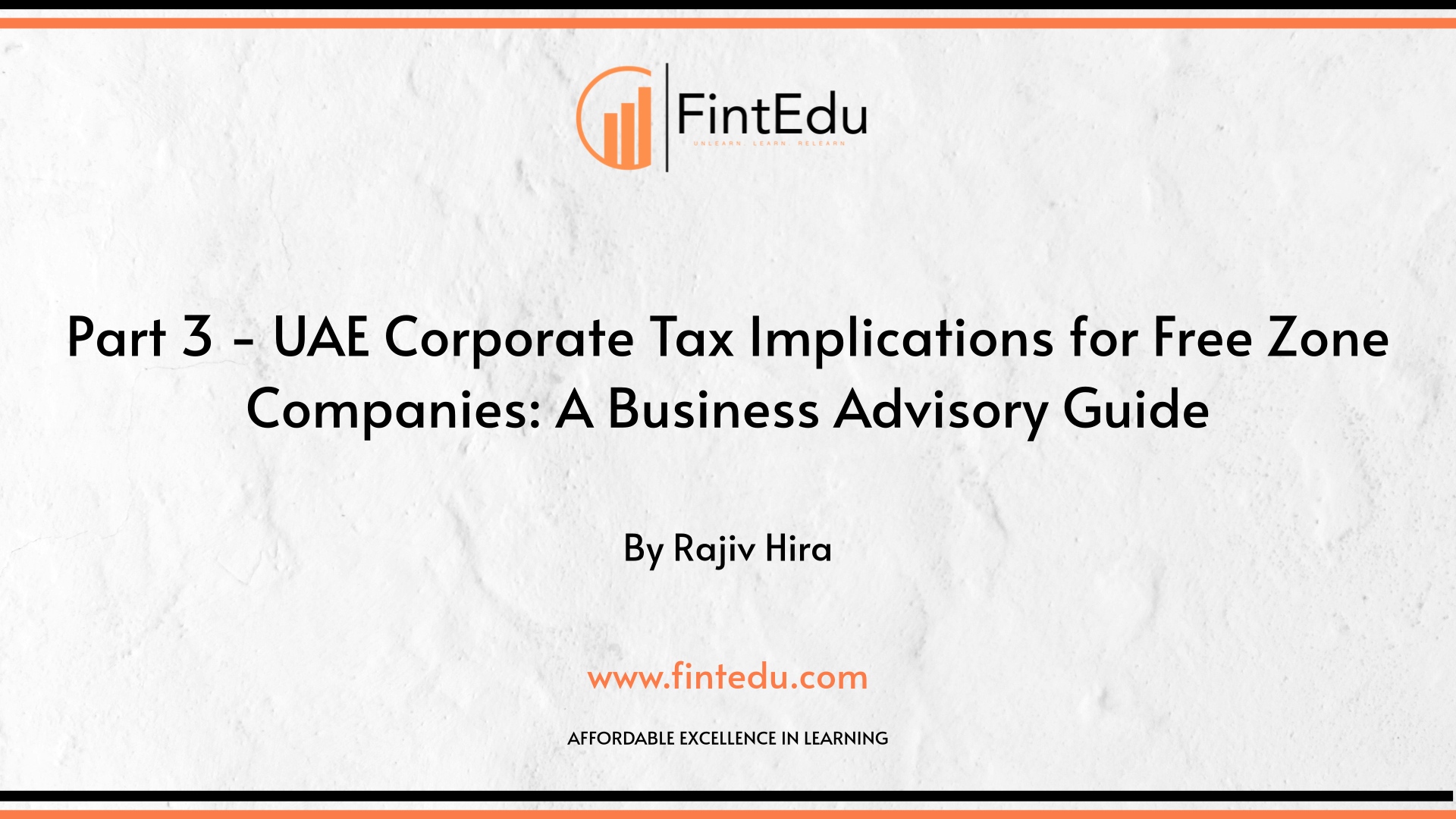LISTEN TO THIS ARTICLE
To assist businesses in interpreting the above laws, the UAE Federal Tax Authority issued a detailed guide titled “Free Zone Persons – Corporate Tax Guide (CTGFZP1)” in May 2024. This guide, while not legally binding, provides valuable clarifications, examples, and best practice interpretations of the Free Zone tax rules. It covers the conditions to be a QFZP in a user-friendly manner and addresses many practical scenarios. Key insights from the guide include:
- Clarification of “Adequate Substance”: The guide emphasizes that a QFZP must have real economic substance in the Free Zone (and in a Designated Zone if the activity is distribution). Specifically, for distribution businesses claiming the 0% rate under the Qualifying Activity of “distribution of goods from a Designated Zone,” the core income-generating activities must be carried out in the Designated Zone itself. Simply holding a license or a storage warehouse in a Designated Zone is not enough if the actual management and sales operations occur elsewhere. An example in the guide shows Company O, which had a warehouse in a Designated Zone but ran its distribution business from an office in a non-designated Free Zone, failing the substance requirement for the distribution activity and thus not qualifying for 0% on that basis. Free Zone companies should therefore align their physical operations with the Free Zone where their qualifying activity is supposed to occur (especially important for Designated Zone distribution vs. non-designated). Adequate substance generally means having sufficient staff, office space, and expenditure in the Free Zone to carry on the core business, mirroring the UAE’s Economic Substance Regulations approach.
- Application of the Beneficial Recipient Rule: The guide explains how to determine if a transaction is truly “with” a Free Zone Person. For example, if a Free Zone company provides services to a Free Zone company that is merely an intermediary, and the end-user is a mainland entity, the income may be treated as derived with a mainland (Non-Free Zone) person. Businesses are guided to look through arrangements to identify the actual beneficiary of the goods/services to ensure compliance with the Cabinet Decision’s requirement.
- Permanent Establishment (PE) Risk: The guide provides scenarios of what might constitute a Domestic Permanent Establishment of a Free Zone company in the mainland. For instance, if a Free Zone company’s employees regularly work in the mainland to carry out the business (e.g. a team delivering goods outside the Free Zone), this could risk creating a taxable presence. However, the guide illustrates that routine activities carried out outside the Free Zone (such as last-mile delivery or installation services) do not necessarily create a PE if those employees have no authority to conclude contracts and the company has no fixed place of business in the mainland. In one example, Company P had 480 delivery staff operating across the UAE (outside the Free Zone) but since contracts were managed and concluded from within the Designated Zone and the outside activities were merely auxiliary (and no branch office existed), the company was not deemed to have a mainland PE. This guidance is crucial for logistics and service companies that inevitably have to operate beyond the confines of the Free Zone, they must structure those activities carefully to avoid unintentionally becoming fully taxable.
- Compliance and Election: The guide reiterates compliance obligations, including the need for transfer pricing documentation for related-party dealings, and the option available in the law for a QFZP to irrevocably (for the tax period and next 4 tax periods) elect to be taxed at the standard rate (should it wish to forego the 0% regime) . It cautions that once a Free Zone person elects out, it cannot enjoy the 0% rate unless it requalifies under conditions set by the Minister (which currently are strict, effectively locking the entity out of the regime for a number of years).
Disclaimer: Content posted is for informational and knowledge sharing purposes only, and is not intended to be a substitute for professional advice related to tax, finance or accounting. The view/interpretation of the publisher is based on the available Law, guidelines and information. Each reader should take due professional care before you act after reading the contents of that article/post. No warranty whatsoever is made that any of the articles are accurate and is not intended to provide, and should not be relied on for tax or accounting advice.
Related Articles
Part 1 - UAE Corporate Tax Implications for Free Zone Companies: A Business Advisory Guide
Part 2 - UAE Corporate Tax Implications for Free Zone Companies: A Business Advisory GuidePart 4 - UAE Corporate Tax Implications for Free Zone Companies: A Business Advisory Guide
Part 5 - UAE Corporate Tax Implications for Free Zone Companies: A Business Advisory Guide.
Part 6 - UAE Corporate Tax Implications for Free Zone Companies: A Business Advisory Guide.Part 7 - UAE Corporate Tax Implications for Free Zone Companies: A Business Advisory Guide.
Part 8 - UAE Corporate Tax Implications for Free Zone Companies: A Business Advisory Guide.
Part 9 - UAE Corporate Tax Implications for Free Zone Companies: A Business Advisory Guide.
Contributor
Related Posts

@@PLUGINFILE@@/Part%209%20-%20UAE%20Corporate%20Tax%20Implications%20for%20Free%20Zone%20Compa...
Read More
@@PLUGINFILE@@/Part%208%20-%20UAE%20Corporate%20Tax%20Implications%20for%20Free%20Zone%20Compa...
Read More
@@PLUGINFILE@@/As%20we%20approach%2031%20March%202025%2C%20businesses%20with%20a%20VAT%20year%...
Read More